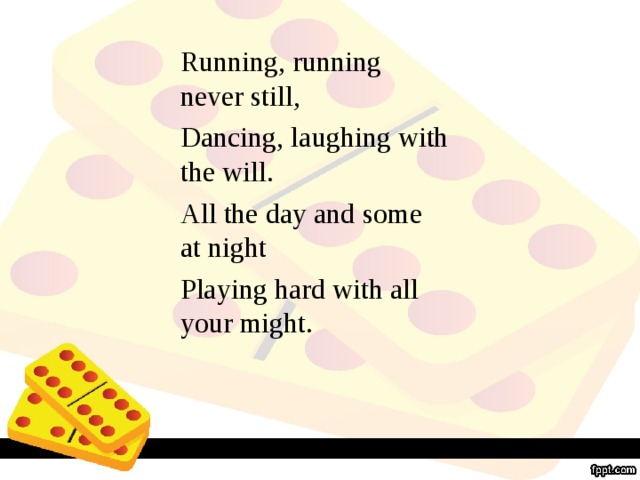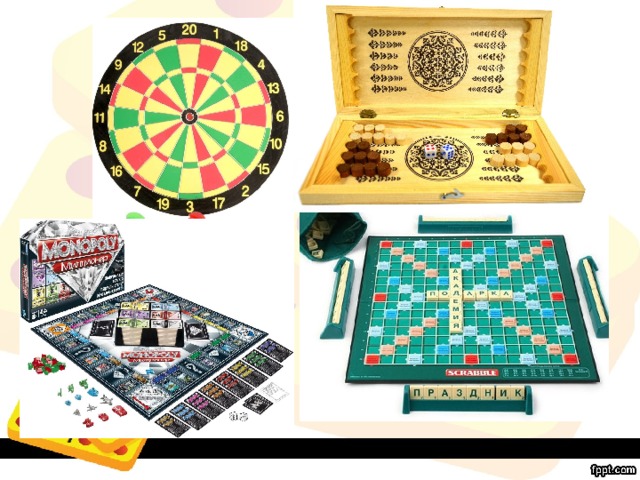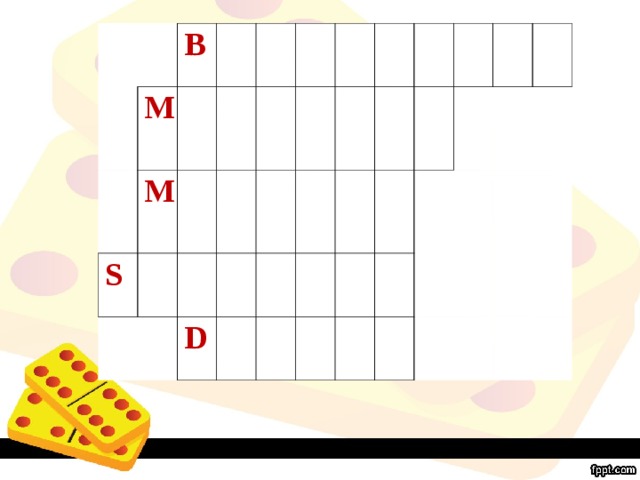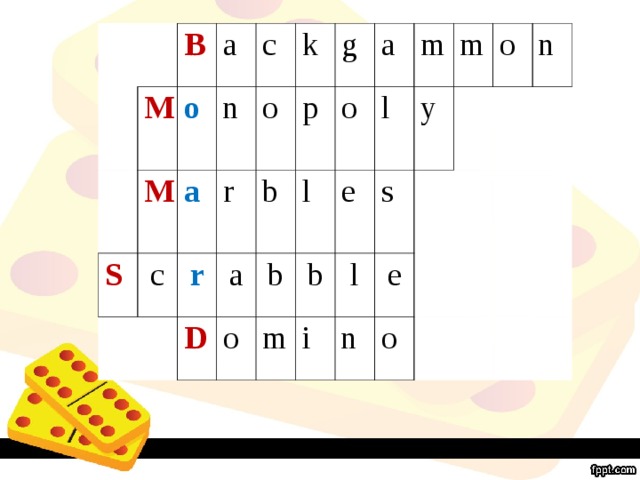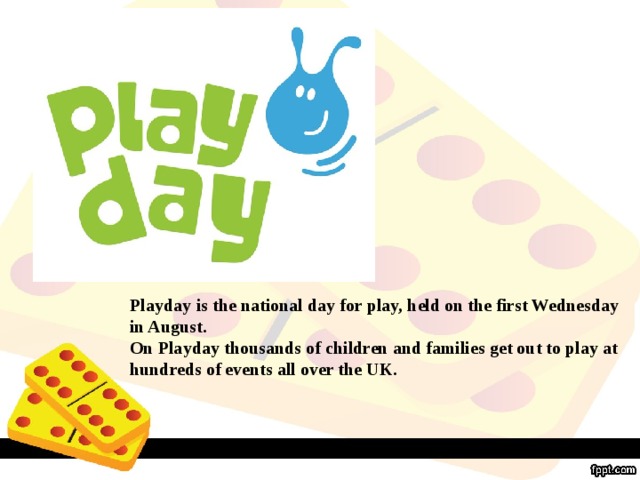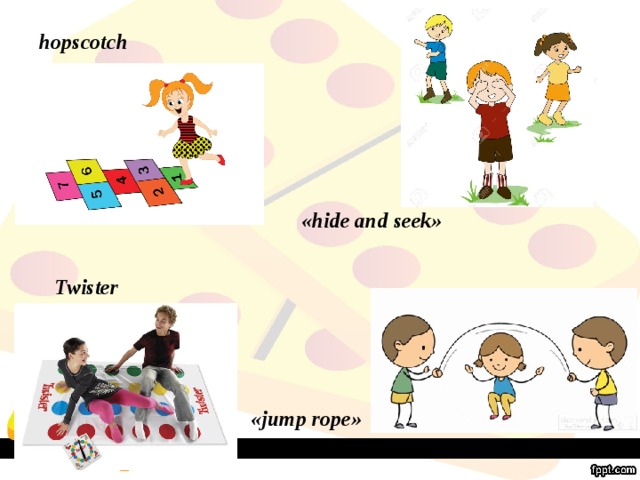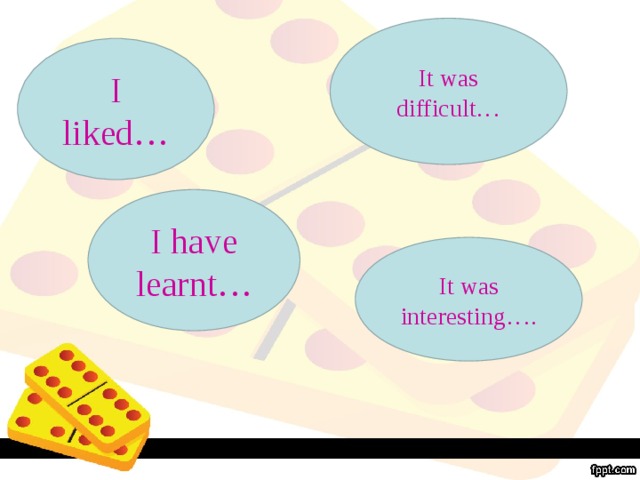«Методическая разработка урока гуманитарного цикла с применением технологии исследовательского обучения»
МБОУ "СОШ № 4 г. Шатуры"
г.о. Шатура
| Этап урока | Деятельность учителя | Деятельность учащихся |
Организационный момент Warming-up activities |
|
| Good afternoon. How are you? I hope you are well today. I’m very glad to see you again. Are you ready for the lesson? | Отвечают на приветствие учителя. |
Фонетическая зарядка Phonetic drills |
|
|
| Let`s start our lesson with the phonetic drills. Look at the screen, name the sound and read the words with this sound: (учитель показывает ученикам транскрипционные значки и просит назвать звуки и английские слова с ними) (Слайд 4) [w] – windsurfing, swimming, win [ʌ]- success , puzzle, fun [ı] - win, billiard, jigsaw puzzle [a:] – marbles, darts, partner [ɳ] – meeting, fishing, cycling [æ] –scrabble, backgammon, acting
Let’s read the rhyme.
Running, running never still, Dancing, laughing with the will. All the day and some at night Playing hard with all your might.
|
Учащиеся называют звуки и слова.
Учащиеся проговаривают рифмовку.
|
Основная часть урока Постановка цели и задач урока. Мотивация учебной деятельности учащихся. |
|
| I want you to guess the theme of our lesson. Look at the screen, do the crossword and say what our lesson is about. (Показ картинок со слайдами. Слайд 4). Yes, you are right, it’s Games. Board Games. (Слайд 5, 6) We’ll speak about our free time, get information about English board games, speak about Russian (board) games. I hope the lesson will be interesting for you and you will enjoy it. Well, let's start. |
Учащиеся решают кроссворд. Формулируют тему урока. |
| 2) Осмысление (Realization of meaning). Задача: поддержать активность, интерес и инерцию движения, созданную во время стадии вызова; поддержать усилия учащихся по отслеживанию собственного понимания. |
|
| Well, now I want to know more about you. What do you like doing in your free time? So, most of you like doing sports and listening to music. But what do your classmates enjoy doing in their free time? Tell us the results of your survey. Complete the sentences: Most of my classmates enjoy…. because… Some like…. The most popular games are… | Учащиеся отвечают на вопросы учителя.
Учащиеся сообщают о результатах проведенного опроса одноклассников: любимые занятия в свободное время; каким играм отдают предпочтение. |
Развитие навыков аудирования (Listening) |
|
| I’d like to tell you about Play Day in Britain. Play day is the national day for play. It is on the first Wednesday in August. On Play day thousands of children and families get out to play at hundreds of community events across the UK. It’s easy to celebrate Playday – it doesn’t matter whether your plans are big or small, what’s most important is that children and young people get the opportunity to get out to play for the day, and that collectively we highlight the importance of play in children’s lives. To celebrate Playday, children, young people and communities get out and play at hundreds of events all over the UK. There are street parties, festivals in parks or village greens, mass adventures in woodlands, fields, even beaches, and public events on this day.
So, I’d like you to answer some questions. Do we have such a holiday in Russia? What games do they all play on this day? (Слайд 8) Do you play these games? Do British children play the same games, board games as Russian children play? |
Учащиеся слушают рассказ учителя.
Учащиеся отвечают на вопросы.
Выдвигаем гипотезу, что дети и в России, и в Великобритании играют в одинаковые игры на улице и дома. |
Развитие умений и поискового чтения (Reading) |
|
| Listen, read and answer the questions – ex. 1, p. 61
Which game is about solving a crime? Which game is about buying and selling property? Which game uses letters to make words? -
Now Ex. 2. Read again and mark sentences YES or NOW. | Учащиеся прослушивают запись и читают задание упр. 1 стр. 61. Отвечают на вопросы. Cluedo Monopoly Scrabble Работа в группах.
|
| Физкультминутка: https://www.youtube.com/watch?v=gCJDXYNa4EE Учащиеся повторяют движения под музыку. |
Развитие умений чтения с пометками, составление тезисов (плана) и составление устного сообщения по тексту. |
|
| Read the text "Interesting Facts About Board Games You Didn’t Know." Make the notice, V – the information is known to you (данная информация соответствует тому, что вы знали раньше); (+) – the information is new for you (то, что вы читаете, является для вас новой информацией); (-) - you think this information is wrong (то, что вы читаете, противоречит тому, что вы знали раньше или думали, что знаете); (?) – the information is not clear or you want to get more details (то, что вы читаете, непонятно, или же вы хотите получить более подробные сведения по этому вопросу). | V | + | - | ? | | I knew it
| it's new
| I thought differently
| It's interesting, unclear, you need to understand it | |
|
|
|
|
| Учащиеся работают в группах. Читают тексты, делают пометки.
Сведения из текста заносятся в таблицу кратко, что позволяет записать конспект
|
Развитие умений и навыков устной речи |
|
| And now work in groups of 4 and discuss your results.
Well, I hope you are ready to present the results of your work to the class.
Ex. 5 p. 61. What is the most popular board game in your country? Make notes under the headings, and then talk about it. Name Aim How to play it Number of players Why should we play this board game? Can you answer the question of our lesson? Do you play the same games as the British children play? | Работа в группах; проговаривание и обсуждение информации, записанной учащимися Индивидуальные высказывания; каждая группа высказывается по содержанию одного столбика, а другие группы дополняют информацию, не повторяясь Учащиеся составляют по опорной схеме рассказ о самой популярной игре в России.
Учащиеся отвечают на вопрос, поставленный в начале урока – одинаковые ли игры у детей России и Великобритании. |
Подведение итогов урока. Объяснение домашнее задание. |
|
| Now, please write down your homework: Your task is to prepare a project about popular games in Russia / or about your favourite board game.
| Учащиеся получают задание подготовить мини-проекты о популярных играх в России / или о своей любимой настольной игре |
Подведение итогов урока You worked very well. But that’s all for today and our lesson is going to be over. Your marks are… (учитель оценивает работу учащихся на уроке). |
Рефлексия (слайд 9) |
|
| - What have you learnt today? What did you like more? - Did you like our lesson? Very nice! Well, the lesson is over. Thank you very much for your work and goodbye. | (дети высказывают свои мнения об уроке)
|







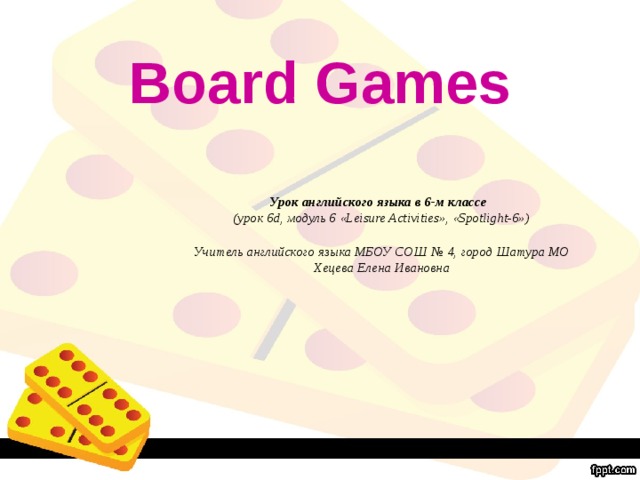
![[w] – w indsurfing, s w imming, w in [ʌ]- s u ccess , p u zzle, f u n [ı] - w i n, b i lliard, j i gsaw puzzle [a:] – m ar bles, d ar ts, p ar tner [ɳ] – meeti ng, fishi ng, cycli ng [æ] – scr a bble, backg a mmon, a cting](https://fsd.multiurok.ru/html/2018/11/13/s_5beb3987ac4b8/img_s997203_1_1.jpg)
